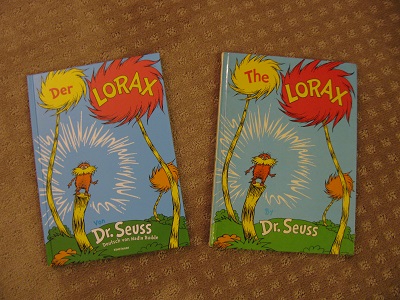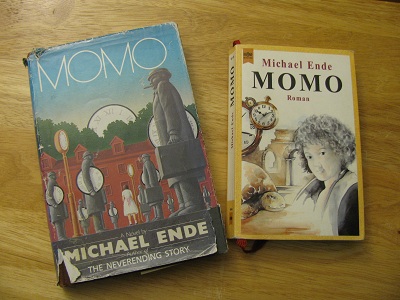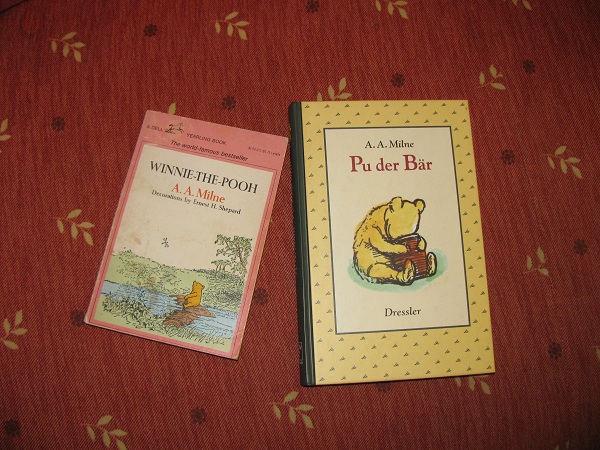
It’s been almost two months, but it’s time for Sonderling Sunday! That time of the week when I play with language by looking at the German translation of children’s books.
This week, I don’t have much time, but I’m going to do a little bit anyway! Tonight we’ll look at Der Lorax. This one’s fun because it’s poetry, so I’ll usually do a section at a time and then give a more direct translation from the German back to the English, so you can see how things were changed to make them more poetical.
Last time, we left off as the Bar-ba-loots sadly walked away because the Thneed business needs to grow.
And then we come to the new factory:
“I meant no harm. I most truly did not.
But I had to grow bigger. So bigger I got.
I biggered my factory. I biggered my roads.
I biggered my wagons. I biggered the loads
of the Thneeds I shipped out. I was shipping them forth
to the South! To the East! To the West! To the North!
I went right on biggering . . . selling more Thneeds.
And I biggered my money, which everyone needs.”
= Ich wollte nichts Böses, auf gar keinen Fall.
Doch der Laden muss wachsen, so ist das nun mal.
Es wuchs die Fabrik, es wuchsen die Kisten.
Es wuchsen die Schnauchbestellungslisten.
Es wuchsen die Straßen. Es wuchs der Transport
von Waggons voll mit Schnäuchen. Wir schifften sie fort —
nach Osten, nach Süden, nach West oder Nord.
Es wuchs einfach alles, das Geld wuchs auch.
Und Geld is etwas, das jedermann braucht.
(“I wanted nothing evil, absolutely no way.
But the shop must grow, and that’s simply that.
It grew the factory, it grew the crates.
It grew the Thneeds-order-list.
It grew the streets. It grew the transport
of trucks full of Thneeds. We shipped them forth
from the east, from the south, from the west or north.
It grew simply everything, the money grew also.
And money is something that everyone needs.”)
My favorite rhyme in that previous section is definitely Kisten rhymed with Schnauchbestellungslisten.
Yes, the rhymes are fun. Listen to this one:
“Then again he came back! I was fixing some pipes
when that old-nuisance Lorax came back with more gripes.”
= Doch später, ich war bei den Abwasserkammern,
kam dieser Lorax, um wieder zu jammern.
(“Then later, I was in the wastewater chambers,
came this Lorax, again to whine.”)
And then Dr. Seuss makes the English so onomatopoetic. Let’s see how the translator does:
“‘I am the Lorax,’ he coughed and he whiffed.
He sneezed and he snuffled. He snarggled. He sniffed.
‘Once-ler!’ he cried with a cruffulous croak.
‘Once-ler! You’re making such smogulous smoke!
My poor Swomee-Swans. . . why, they can’t sing a note!
No one can sing who has smog in his throat.”
= „Ich bin der Lorax.? Er schnappte. Er schniefte.
Er nieste und japste und keuchte und piefte.
„Einstler?, rief er, jetzt heulte er auch.
„Einstler, du machst so rußigen Rauch!
Meine Schwippschwäne bringen kein Lied mehr heraus.
Diesen Smog in der Kehle, den halt niemand aus.?
I don’t think the translator is making up as many words, but they did get a nice rhythm to the lines. Google Translate says that rußigen Rauch means “sooty smoke” — so if it’s not quite smogulous, well, it’s getting there.
I like the way this paragraph was rephrased for rhythm:
“‘And so,’ said the Lorax,
‘– please pardon my cough —
they cannot live here.
So I’m sending them off.'”
= „Und weil du nicht aufhörst,
hier Dreck rauszupusten,
verschwinden die Schwäne —
verzeih meinen Husten.?
(“And because you don’t stop
here filth out-blowing,
disappear the swans —
pardon my cough.”)
Ah! The translator does well with Gluppity-Glupp:
“‘What’s more,” snapped the Lorax. (His dander was up.)
“Let me say a few words about Gluppity-Glupp.
Your machinery chugs on, day and night without stop
making Gluppity-Glupp. Also Schloppity-Schlopp.'”
= „Doch fast noch schlimmer?, er fing wieder an,
„is dieser üble Schlickerschlamm.
Tag und Nacht schwappt der stinkende Schlubberschlapp
aus dreckigen Rohren, der Schlabberpapp.?
(“‘But almost even worse,’ he began again,
‘is this bad Schlickerschlamm (silty-mud).
Day and night sloshes the stinky Schlubberschlapp
out of dirty pipes, the Schlabberpapp.'”)
When the Humming-Fish leave, some notable words are:
“their gills are all gummed” = sein Mund is verklebt
This rhyme was easy:
“weary” = schwierig
“smeary” = schmierig
Though look at that — they skipped the rhyme about, “Oh, their future is dreary.”
Another interesting word:
“yap-yap” = meckern (“gripe”)
Then the big confrontation:
“And, for your information, you Lorax, I’m figgering
on biggering
and BIGGERING
and BIGGERING
and BIGGERING,
turning MORE Truffula Trees into Thneeds
which everyone, EVERYONE, EVERYONE needs!”
= Ich will noch viel mehr, und zwar jetzt und hier.
Mein Geschäft wird erweitert,
VERGRÖSSERT,
VERBREITERT.
Aus jedem Tuff wird hier ein Schnauch,
weil jeder, JEDER einen braucht!
(“I want a lot more, and that here and now.
My business is extended,
INCREASED,
WIDENED.
For each tuft here is a Thneed,
because everyone, everyone needs one!”)
Instead of “smoke-smuggered stars,” we’ve got verpesteten Ort (“pestilential place”).
Shorter in German:
“seat of his pants” = Hosenboden
“a small pile of rocks” = ein Haufen Steine
Instead of “UNLESS,” the pile of rocks says ES SEI DENN (which seems to mean the same thing).
I like this line:
“I’ve worried about it
with all of my heart.”
= Ich zerbrech’ mir den Kopf,
grüble hin, grüble her.
Very roughly, this is something like: “I rack my brains, speculating in and out.”
“Catch!” = Fang!
“It’s a Truffula Seed.
It’s the last one of all!”
= Der letzte Trüffelasamen von allen!
And here is the finish:
“You’re in charge of the last of the Truffula Seeds.
And Truffula Trees are what everyone needs.
Plant a new Truffula. Treat it with care.
Give it clean water. And feed it fresh air.
Grow a forest. Protect it from axes that hack.
Then the Lorax
and all of his friends
may come back.”
= Trüffelas sind, das weißt du nun auch,
etwas, was wirklich jeder braucht.
Pflanz einen Trüffela, und vergiss bitte nicht
klares Wasser, frische Luft, viel Pflege und Licht.
Mach einen Wald draus, hege ihn gut,
schütz ihn vor Äxten, sei auf der Hut!
Das ist dein Auftrag, du schaffst das, viel Glück!
Und vielleicht kommt der Lorax
mit seinen Freunden
zurück.
(“Truffulas are, that know you now also,
something that really everyone needs.
Plant a Truffula, and please don’t forget
clear water, fresh air, much care and light.
Make a forest around, cherish it well,
protect it from axes, be on your guard!
That is your job, you can do it, good luck!
And perhaps comes the Lorax
with his friends
back.”)
Look! I finished a book! I went longer than I meant to, but in doing so I biggered my fun.
Viel Glück!









